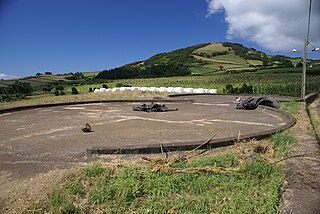
In historical linguistics, cognates or lexical cognates are sets of words that have been inherited in direct descent from an etymological ancestor in a common parent language. Because language change can have radical effects on both the sound and the meaning of a word, cognates may not be obvious, and often it takes rigorous study of historical sources and the application of the comparative method to establish whether lexemes are cognate. Cognates are distinguished from loanwords, where a word has been borrowed from another language.
A false etymology is a false theory about the origin or derivation of a specific word or phrase. When a false etymology becomes a popular belief in a cultural/linguistic community, it is a folk etymology. Nevertheless, folk/popular etymology may also refer to the process by which a word or phrase is changed because of a popular false etymology. To disambiguate the usage of the term "folk/popular etymology", Ghil'ad Zuckermann proposes a clear-cut distinction between the derivational-only popular etymology (DOPE) and the generative popular etymology (GPE): the DOPE refers to a popular false etymology involving no neologization, and the GPE refers to neologization generated by a popular false etymology.
Nadsat is a fictional register or argot used by the teenage gang members in Anthony Burgess's dystopian novel A Clockwork Orange. Burgess was a linguist and he used this background to depict his characters as speaking a form of Russian-influenced English. The name comes from the Russian suffix equivalent of -teen as in thirteen. Nadsat was also used in Stanley Kubrick's film adaptation of the book.
Shelta is a language spoken by Mincéirí, particularly in Ireland and the United Kingdom. It is widely known as the Cant, to its native speakers in Ireland as de Gammon or Tarri, and to the linguistic community as Shelta; other terms for it include the Seldru, and Shelta Thari, among others. The exact number of native speakers is hard to determine due to sociolinguistic issues but Ethnologue puts the number of speakers at 30,000 in the UK, 6,000 in Ireland, and 50,000 in the US. The figure for at least the UK is dated to 1990; it is not clear if the other figures are from the same source.

Svarog is a Slavic god of fire and blacksmithing, who was once interpreted as a sky god on the basis of an etymology rejected by modern scholarship. He is mentioned in only one source, the Primary Chronicle, which is problematic in interpretation. He is presented there as the Slavic equivalent of the Greek god Hephaestus. The meaning of his name is associated with fire. He is the father of Dazhbog and Svarozhits.

Svetovit, Sventovit, Svantovit is the god of abundance and war, and the chief god of the Slavic tribe of the Rani, and later of all the Polabian Slavs. His organized cult was located on the island of Rügen, at Cape Arkona, where his main temple was also located. According to the descriptions of medieval chroniclers, the statue representing this god had four heads, a horn and a sword, and to the deity himself were dedicated a white horse, a saddle, a bit, a flag, and eagles. Once a year, after the harvest, a large festival was held in his honor. With the help of a horn and a horse belonging to the god, the priests carried out divinations, and at night the god himself rode a horse to fight his enemies. His name can be translated as "Strong Lord" or "Holy Lord". In the past it was often mistakenly believed that the cult of Svetovit originated from St. Vitus. Among scholars of Slavic mythology, Svetovit is often regarded as a Polabian hypostasis of Pan-Slavic god Perun. His cult collapsed in 1168.
Etymology is the scientific study of the origin and evolution of a word's semantic meaning across time, including its constituent morphemes and phonemes. It is a subfield of historical linguistics, philology, and semiotics, and draws upon comparative semantics, morphology, pragmatics, and phonetics in order to construct a comprehensive and chronological catalogue of all meanings that a morpheme, phoneme, word, or sign has carried across time.
Folk etymology – also known as (generative) popular etymology, analogical reformation, (morphological)reanalysis and etymological reinterpretation – is a change in a word or phrase resulting from the replacement of an unfamiliar form by a more familiar one through popular usage. The form or the meaning of an archaic, foreign, or otherwise unfamiliar word is reinterpreted as resembling more familiar words or morphemes.

A rushnyk or rushnik is a decorative and ritual cloth. Made of linen or cotton it usually represents woven or embroidered designs, symbols and cryptograms of the ancient world. They have been used in sacred East Slavic rituals, religious services and ceremonial events such as weddings and funerals. Each region has its own designs and patterns with hidden meaning, passed down from generation to generation and studied by ethnographers.
L-vocalization, in linguistics, is a process by which a lateral approximant sound such as, or, perhaps more often, velarized, is replaced by a vowel or a semivowel.
"Break a leg" is a typical English idiom used in the context of theatre or other performing arts to wish a performer "good luck". An ironic or non-literal saying of uncertain origin, "break a leg" is commonly said to actors and musicians before they go on stage to perform or before an audition. Though the term likely originates in German, the English expression is first attributed in the 1930s or possibly 1920s, originally documented without specifically theatrical associations. Among professional dancers, the traditional saying is not "break a leg", but the French word merde.

Threshing (thrashing) was originally "to tramp or stamp heavily with the feet" and was later applied to the act of separating out grain by the feet of people or oxen and still later with the use of a flail. A threshing floor is of two main types: 1) a specially flattened outdoor surface, usually circular and paved, or 2) inside a building with a smooth floor of earth, stone or wood where a farmer would thresh the grain harvest and then winnow it. Animal and steam powered threshing machines from the nineteenth century onward made threshing floors obsolete. The outdoor threshing floor was either owned by the entire village or by a single family, and it was usually located outside the village in a place exposed to the wind.

A bressummer, breastsummer, summer beam is a load-bearing beam in a timber-framed building. The word summer derived from sumpter or French sommier, "a pack horse", meaning "bearing great burden or weight". "To support a superincumbent wall", "any beast of burden", and in this way is similar to a wall plate.

Russian traditions and superstitions include superstitions and folk rituals of the Russian community. Many of these traditions are staples of everyday life, and some are even considered common social etiquette despite being rooted in superstition. The influence of these traditions and superstitions vary, and their perceived importance depends on factors such as region and age.

Iron has a long and varied tradition in the mythology and folklore of the world.
Rebracketing is a process in historical linguistics where a word originally derived from one set of morphemes is broken down or bracketed into a different set. For example, hamburger, originally from Hamburg+er, has been rebracketed into ham+burger, and burger was later reused as a productive morpheme in coinages such as cheeseburger. It is usually a form of folk etymology, or may seem to be the result of valid morphological processes.
Polterabend is a German and to a lesser extent Polish, Austrian and Swiss wedding custom in which, on the night before the wedding, the guests break porcelain to bring luck to the couple's marriage. The belief in the effectiveness of this custom is expressed by the old adage: "Shards bring luck". The expression is derived from a time when the word "shard" referred to the unbroken clay pots of pottery makers, and not just the broken pieces. It was said that a full jar was a lucky thing to have, therefore the expression "shards bring luck".

A superstition is any belief or practice considered by non-practitioners to be irrational or supernatural, attributed to fate or magic, perceived supernatural influence, or fear of that which is unknown. It is commonly applied to beliefs and practices surrounding luck, amulets, astrology, fortune telling, spirits, and certain paranormal entities, particularly the belief that future events can be foretold by specific unrelated prior events.
Jesza or Jasza is an alleged Polish god. He was first mentioned around 1405-1412 in the sermons of Lucas of Wielki Koźmin, which warned against the worship of Jesza and other gods during spring rituals and folk performances. His popularity is partly owed Jan Długosz's comparison of him to the Roman god Jupiter. However, contemporary researchers largely reject the authenticity of the deity.

Svarog is a Slavic god of fire and smithing mentioned in the Slavic translation of the Chronicle of John Malalas found in the Primary Chronicle as the Slavic equivalent of the Greek god Hephaestus.









